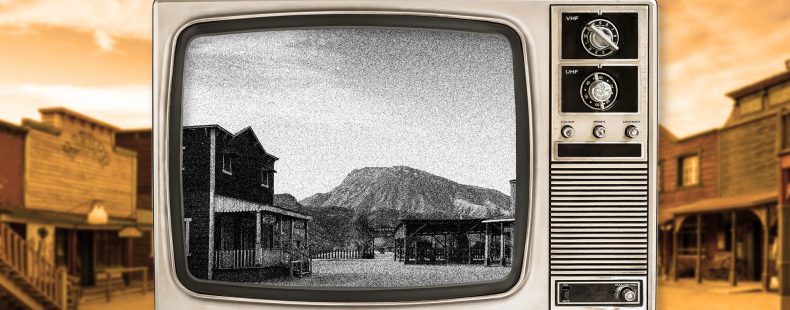The world of movies delivers a lot of memorable words in the form of classic quotes and witty one-liners. Sometimes, though, the big screen also debuts entirely new words or casts an existing word in an entirely new role. Some words, of course, were created with certain movies in mind.
For this article, we put out a casting call for words that got their big break thanks to film. In return, we got an ensemble cast that spans a range of dates and genres. Holly-would you like to learn about words that were either invented or popularized by their use in movies? Then this is just the list for you!
twitterpated (Bambi, 1942)
The wonderfully fun word twitterpated comes to us courtesy of the owl in Bambi (1942), who describes it as a state of feeling light as a feather and knocked for a loop due to seeing a pretty face. We’ve distilled Friend Owl’s definition to “excited as overcome by romantic feelings” or “smitten.” The word is a combination of twitter, as in “tremulous excitement,” and pate, as in “head” or “brain.”
bombshell (Bombshell, 1933)
Many of us know the word bombshell to mean “an attractive girl or woman,” but lesser known is that this sense was popularized by the 1933 movie titled Bombshell starring Jean Harlow. Prior to this film, the word was primarily used to refer to a bomb or, in a figurative extension, something or someone having a sudden and sensational effect. Jean Harlow mesmerized audiences and was commonly referred to as “the Blonde Bombshell,” likely as a reference to this movie. Considering the captivating and sensational effect Ms. Harlow has on viewers to this day, the evolution of this term to refer to a particularly alluring woman comes as no surprise.
sheik (The Sheik, 1921)
Another word that was influenced by the appearance and charisma of an actor is sheik. Prior to the 1921 movie The Sheik starring silent-film heartthrob Rudolph Valentino, this term was primarily used in Islamic countries to refer to a patriarch of a tribe or family or as a term of polite address. The film, which was based on Edith Maude Hull’s best-selling novel of the same name, gave rise to a new sense of the word sheik as “a man held to be masterful and irresistibly charming to women.” The word sheik comes from the Arabic shayḫ meaning “old man” or “chief.”
supercalifragilisticexpialidocious (Mary Poppins, 1964)
The word supercalifragilisticexpialidocious was made famous in the 1964 film Mary Poppins, in which the titular character used it to summarize how she felt after winning a horse race. We define it as a nonsense word used by children to express approval along the lines of “fantastic!” Versions of the word were in circulation before Ms. Poppins came along, but it took a magical, musical nanny to make this medicine of lexical evolution go down (in a most delightful way).
godfather (The Godfather, 1972)
The movie The Godfather gave us a range of memorable phrases, such as “I’m gonna make him an offer he can’t refuse” and “Leave the gun; take the cannoli.” But it’s also responsible for expanding the senses of the word godfather to include “a Mafia leader.” Prior to this film, which was based on Mario Puzo’s novel of the same name, the word godfather was primarily used to refer to a man who serves as sponsor for a child at baptism, or any male or guardian.
gaslight (Gaslight, 1940 and 1944)
The word gaslight is used to refer to causing a person to doubt their own sanity or judgment through psychological manipulation. We are not trying to trick you when we say that this term was brought to the public spotlight in America largely thanks to the 1944 film Gaslight. In the film, a husband makes his wife doubt her own sanity by insisting real events such as dimming gas lamps are figments of her imagination. This film is even often credited with coining the term gaslight, despite the fact that an earlier 1940 British film was also based on the 1938 play Gas Light.
paparazzo (La Dolce Vita, 1960)
As you likely know, the words paparazzo and paparazzi refer to celebrity-obsessed photographers. The word paparazzo was popularized by the 1960 Italian film La Dolce Vita, which featured a character named Paparazzo played by actor Walter Santesso. This Paparazzo was a news photographer determined to do whatever it took to get the perfect picture. While the explanation for how director Federico Fellini came up with Paparazzo’s name is often disputed, there is no doubt that this film popularized two commonly used words for aggressive photojournalists.
red pill and blue pill (The Matrix, 1999)
The 1999 science fiction film The Matrix had a huge pop cultural impact, but we are just going to focus on one particular scene from it for now. In a famous scene, the character Neo (Keanu Reeves) is offered a choice of accepting a red pill that will wake him up to the painful reality of the world or accepting a blue pill that will make him return to blissful ignorance. Today, variations of the terms red pill and blue pill are often used to describe people who supposedly are willing to accept harsh truths or supposedly unwilling to accept painful realities, respectively.
toast (Ghostbusters, 1984)
Learnin’ about words makes us feel good. The word toast is often used in a slang sense to mean something is doomed or dead. This particular sense of toast is often attributed to actor Bill Murray in the 1984 film Ghostbusters. In the original script, Murray’s line was “I’m gonna turn this guy into toast!” The final cut of the film, however, uses an ad-libbed line where Murray instead says, “This chick is toast!” Most sources suggest that Murray’s ad lib inspired the popular slang sense of toast that is still common today.
bucket list (The Bucket List, 2007)
The term bucket list, based on the phrase kick the bucket, is often said to have been popularized in modern use by the 2007 film The Bucket List. Its usage in the film is credited to scriptwriter Justin Zackham, who made his own personal bucket list after graduating college in the late 1990s. Zackham is often credited with coining the term bucket list by most sources, but some have suggested the term was used long before the 2007 film popularized it.
catfish (Catfish, 2010)
The word catfish is used as a slang term to mean “to deceive, swindle, etc., by assuming a false identity or personality online.” This slang sense of catfish comes from the 2010 documentary film Catfish. In the film, a man is deceived into developing romantic feelings for a woman who doesn’t actually exist. During the movie, the trickster’s husband metaphorically compares the situation to an urban legend in which fishermen use catfish to keep live cod physically active during transport. As bizarre as it may seem, this fishy metaphor apparently inspired the title of the film and gave the world a new popular slang term for online fraudsters.
MILF (American Pie, 1999)
The slang word MILF or milf refers to an attractive older woman, usually a mother. It is a shortening of a not-safe-for-work phrase and has inspired similar slang terms referring to attractive people, such as DILF and GILF. The term MILF has been recorded since the 1990s, but the 1999 comedy film American Pie is often credited with giving the term wide popularity. In the film, the word MILF is used to describe the character Jeanine Stifler played by Jennifer Coolidge.














